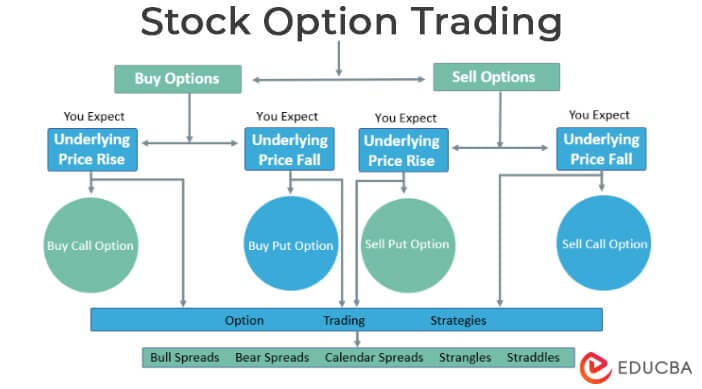Intriguing Investment Strategies: Integrating Options into Your Stock Trading
Imagine stepping into the bustling arena of the financial markets, eager to amplify your returns. As you navigate the intricate dance of stock trading, a whisper of opportunity echoes — options. These versatile financial instruments offer a transformative gateway, empowering you to enhance your portfolio’s potential and secure greater rewards.

Image: www.educba.com
In this comprehensive guide, we embark on an exploratory journey into the world of options trading, unraveling its nuances and unlocking strategies to supplement your stock trading regimen. From defining options to deciphering their historical significance, we will illuminate the path towards harnessing this powerful tool.
Options: An Overview
An option is simply a contract that grants you the right, not the obligation, to buy or sell an underlying asset at a specified price within a defined timeframe. You have the flexibility to exercise this right at any point until its expiration date.
Options are categorized into two types: calls and puts. Call options confer the right to buy, while put options provide the right to sell the underlying asset. Understanding these options’ interplay with stock trading is crucial for successful implementation.
Unleashing the Power of Options
Options empower you with the ability to amplify your returns through various strategies. Here are a few exemplary tactics:
- **Hedging:** Options can safeguard your stock portfolio against adverse market movements. By purchasing a put option, you establish a safety net to protect your investments from potential downturns.
- **Income Generation:** Options can serve as a consistent source of income through a strategy known as “covered calls.” By selling call options on stocks you own, you collect premiums while still retaining the potential for stock appreciation.
- **Leverage:** Options provide leverage, allowing you to control a larger position than your account balance would otherwise permit. This leverage can enhance your returns, but proceed with caution as it also amplifies potential losses.
To maximize the benefits of options trading, it’s imperative to master the art of selecting strike prices and expiration dates. These factors significantly influence the premiums you pay or receive and the subsequent profitability of your options strategy.
Latest Trends and Developments in Options Trading
The options market is constantly evolving, with innovative strategies and technological advancements emerging. Here are a few noteworthy trends:
- **Exchange-Traded Options:** Exchange-traded options provide increased liquidity and transparency compared to over-the-counter options, making them more accessible to retail investors.
- **Option Analytics Platforms:** These platforms provide sophisticated tools for analyzing options strategies, enabling traders to make informed decisions in a rapidly changing market environment.
- **Algo Trading:** Algorithmic trading techniques are gaining traction in options trading, enabling traders to automate their strategies and execute trades with greater precision and speed.
/financial-stock-market-graph-chart-of-stock-market-investment-trading-1086745334-129a8996fb374cc889aae30eb8e43bff.jpg)
Image: www.investopedia.com
Tips and Expert Advice for Profitable Options Trading
1. **Start Small:** Begin your options journey with small trades to gain experience and confidence before scaling up your involvement.
2. **In-Depth Research:** Thoroughly research the underlying assets and the options chain before making any trades. Understanding the risks and rewards involved is essential.
3. **Consider Risk Tolerance:** Options trading can amplify returns, but it also carries inherent risks. Determine your risk appetite and align your trading strategy accordingly.
4. **Seek Professional Guidance:** If you’re new to options trading, consider seeking guidance from an experienced financial advisor or mentor to navigate the complexities of this market.
FAQs: Demystifying Options Trading
Q: What are the differences between options and futures?
A: Options convey the right to buy or sell, while futures contracts obligate you to buy or sell the underlying asset at a predetermined price and date.
Q: How can I learn more about options trading?
A: Online courses, books, and reputable brokerage firms offer educational resources to equip you with the knowledge and skills required for options trading.
Q: Is options trading suitable for all investors?
A: Options trading requires a higher level of understanding and risk tolerance. It’s advisable to have a solid foundation in stock trading and an appetite for risk before venturing into options.
Supplement Stock Trading With Options

Image: www.pinterest.co.kr
Conclusion
Integrating options into your stock trading arsenal can be a lucrative strategy to enhance returns and diversify your portfolio. By embracing the transformative power of options, you gain access to a myriad of opportunities to generate income, hedge against risks, and leverage your investment potential.
Whether you’re a seasoned investor or a novice seeking to expand your horizons, options trading offers a compelling path to financial success. As you delve deeper into this dynamic market, remember to prioritize research, risk management, and strategic execution.
Are you intrigued by the prospect of supplementing your stock trading strategy with options? Join the conversation by sharing your insights and experiences in the comments section below.






